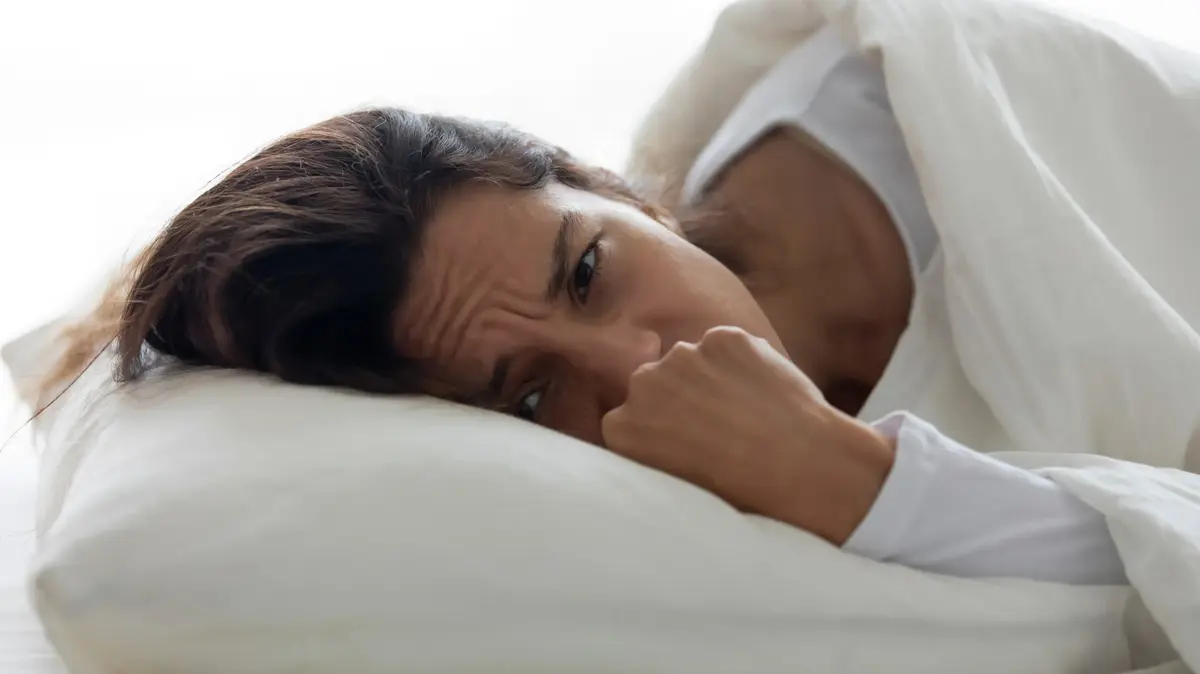“In the space of a century, our nights have considerably diminished,” says Dr Philippe Beaulieu, sleep doctor, in despair. According to a study by Public Health France published in 2019, a third of French people sleep less than 6 hours per night. If we close our eyes for a shorter period of time, our nights are also often not very restorative. Some people accumulate a sleep debt without really realizing it and suffer the negative consequences. How do we know if our nights are of good quality? Philippe Beaulieu, sleep doctor at Henri-Mondor hospital in Paris, co-author of the book
Dormir sans médocs ni tisanes
(1), and chronobiologist Claire Leconte help us identify the alarm signals sent by our body.
Read also »
Why can't we sleep when we are exhausted?
In video, 5 signs that show you are in sleep debt
You are in slow motion
Getting up on the right foot is not just an expression.
According to sleep doctor Philippe Beaulieu, it is necessary to assess this feeling of full recovery as soon as you wake up.
“In normal times, the small residual degree of drowsiness passes very quickly, it is enough to get into action to see it”, explains the specialist.
If not, it must have been a bad night and the effects are quickly felt.
"There is a general slowing down throughout the body, especially at the physical level: it is more difficult to walk or climb the stairs", describes the chronobiologist Claire Leconte.
You need hot water
When it is difficult to get out of your duvet, the shower appears to be the best remedy for laziness.
Except that once in the cabin, the hot water is so pleasant that you are happy to hang out.
“Our biological clock works so that the core temperature rises as we wake up,” says chronobiologist Claire Leconte.
After an insomnia, this process starts less quickly in the morning and we will need hot water to restart everything ”.
You fall asleep during the day
It's 9:30 a.m. and you're already yawning.
“Yawning is a mechanism of action / reaction in relation to the brain which reacts according to our environment: boredom, hunger or sleep,” observes chronobiologist Claire Leconte.
If you unhook your jaw several times a day, apart from meals and meetings, look no further: your body is reacting to intense fatigue.
Sleep specialists call this "excessive daytime sleepiness".
When we accumulate bad nights, the body does not recover physically and psychologically Dr Philippe Beaulieu, sleep doctor
"When we accumulate poor quality nights, the body does not recover physically and psychologically," notes Dr Philippe Beaulieu.
As a result, we have trouble staying awake during the day and we can sometimes have sleep attacks where we fall asleep completely if we do not practice a stimulating activity, during a train trip. , a meeting, a cinema screening ”.
Your belly craves fat and sugar
Speaking of chouquettes, you would definitely take a square of chocolate to accompany your coffee break.
"Disturbed sleep leads to an imbalance in the secretion of hormones that control appetite," reports Dr Philippe Beaulieu.
In the best of all possible worlds, we would go for salads and vegetables but, unfortunately, it's the fat / sugar combo that always appeals to us.
“Sugar improves our attentional capacity,” notes chronobiologist Claire Leconte.
This is its only advantage, but it is short-lived and ultimately promotes diseases such as type II diabetes.
"American studies have shown that the obesity epidemic in the United States comes not only from junk food, but also from the deregulation of biological rhythms", underlines the sleep doctor.
What your sleeping positions reveal
What your sleeping positions reveal
Sleep like a starfish
Olga Ciesco's analysis:
we tend to spread out when we feel comfortable and safe.
When you take up more and more space, your position can also reflect a feeling of domination.
IStock Photo
Sleeping on your back
Olga Ciesco's analysis:
we face our environment.
There is no fear, no aggression, we are not hiding.
We do not feel the need or the desire to create a bubble of protection from the outside.
Photos Getty Images
Sleep on your stomach
Olga Ciesco's analysis:
without being
closed
to the environment, we still turn our backs on it to concentrate on our bed and sleep.
Either we protect ourselves from light or noise, or we adopt the position because we do not sleep at home and we do not like it.
You can choose the position to sleep better.
Photos Getty Images
Sleep with your hands under the pillow
Olga Ciesco's analysis:
our hands often touch something to immediately obtain a tranquilizing, de-stressing effect.
Here, the object acts like a blanket, as if it were a person.
IStock Photo
Sleep with the cushion between the legs
Sleep with your hand on yourself
Sleep in a fetal position
See the slideshow
7 photos
You have a headache
Dry January obliges, you skipped the mojito last night in favor of liters of sparkling water.
Yet this morning it is as if the dishwasher is pounding against your temple.
"Lack of sleep excites a set of nerves and neurons in the brain which can cause a rather embarrassing headache," notes chronobiologist Claire Leconte.
To remedy this, the researcher recommends taking about ten minutes of rest in peace and away from light.
You have muscle stiffness
Your last jog was last week, but now your hamstring muscles don't agree.
A mini stride to catch the bus and you wince.
“At night, the whole body rests to regenerate its tissues.
On the other hand, if the muscles do not relax, inevitably, the muscular tensions of the day before will persist until the next day ”, assures the sleep doctor Philippe Beaulieu.
The self-control of our emotions is dependent on our good formClaire Leconte, chronobiologist
"In anxious people, this stiffening can sometimes cause blepharospasm, in other words a repeated and involuntary contraction of the eyelid", adds chronobiologist Claire Leconte.
You are head in the air
Every day, our brain stores thousands of information.
At nightfall, the latter is not inactive, quite the contrary: he selects, sorts and classifies the slightest memory.
Nevertheless, the accumulated fatigue slows down this well-oiled mechanism.
“Sleep disorders have negative consequences on our ability to concentrate,” points out Dr. Philippe Beaulieu.
And without this sustained attention, it is easier to forget what we have just read or heard ”.
To listen: the editorial podcast
You are on edge
Maybe you shouldn't have refilled yourself a second time at dinner.
But carbonnara pasta isn't the only thing that will be digested overnight: your emotions too.
“Dreams are an important safety valve for evacuating our entire subconscious during REM sleep,” explains chronobiologist Claire Leconte.
When you are at war with Morpheus, this digestion may be greatly altered.
“The self-control of our emotions is dependent on our good form, assures chronobiologist Claire Leconte.
Without the latter, everything is exacerbated, both sensitivity and aggression ”.
(1) Philippe Beaulieu is the co-author of
Dormir sans médocs ni tisanes
(Ed. Marabout) with Dr Olivier Pallanca, 192 p., € 19.90.
* Originally published in 2020, this article has been updated.
The editorial team advises you
Signs that prove you are intellectually fatigued
Five tips to apply daily to be less tired
Fatigue: to keep going, bet on restorative micro-naps












